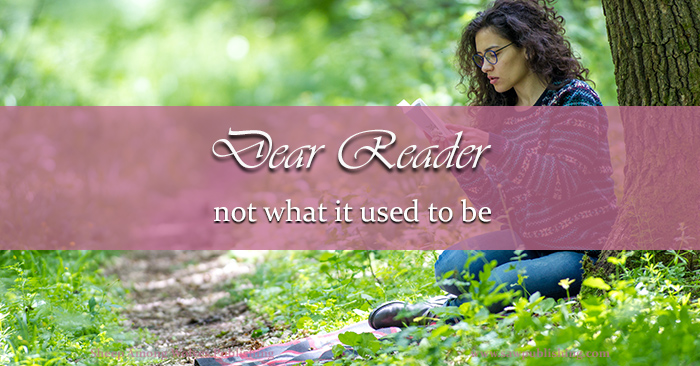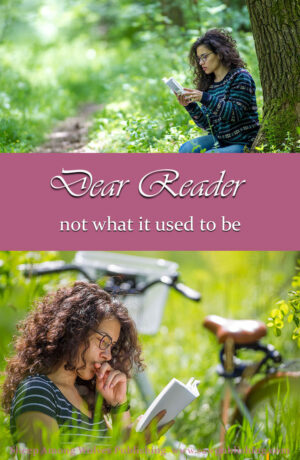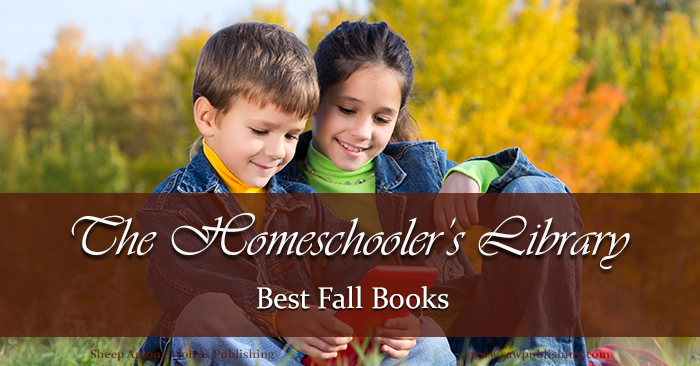Dear Reader: Not What It Used To Be
 “It’s not what it used to be!”
“It’s not what it used to be!”
Yes, we hear it all the time. Hear it about candy bars and Christmas tree prices; church singing and Captain Crunch; car parts and cauliflower. The world is not what it used to be.
Neither are our books.
I can remember, as a pretty small child, hearing my mom lament the lack of well-written picture books.
“But how could a picture book be well-written?” I wondered. “Nobody writes a picture book with “thees” and “thous.”
We had been having Howard Pyle’s Robin Hood read aloud to us, that year. Somebody had said it was well-written, so I’d done the math.
What It Used to Be
Yes, there are people who hate the classics. It’s stereotypical to hate the classics. Stereotypical—but somehow, not stereotypical of you.
You, the inveterate bookworm. You, the homeschooled highschooler, with a passion for six-hundred-page tomes. You, who love Jo March, and Elizabeth Bennet, and Anne Shirley as if they had been living people.
As if???
Okay, we’ll leave that alone for a minute.
The point I’m trying to make is—you love the classics. You value the classics. You get that the authors of the past did something very few people can do today.
 The Golden Age of Novels
The Golden Age of Novels
That is a simple fact. The genius of past writers—at its full strength—is very difficult to reproduce today. The best books of 100 or 200 years back easily trump their modern counterparts when it comes to their complexity of language, their depth of vocabulary, their vivid and detailed development of complex, slowly-unfolding characters.
As Christians, we appreciate their setting in worlds where at least certain aspects of Christianity are more openly accepted as normal.
And of course, those of use who love history just love—the history! It’s hard to beat a Victorian novel for immersing you in Victorianism! All these are wonderful reasons to love the classics, but they may still be overlooking one important viewpoint.
When the Classics Were New
Yes, once-upon-a-time, the classics were new. New!
Not new, as in shiny-off-the-press (though they were that, too) but new as in, a new idea.
New, as in “not what it used to be.”
The classics were written by men and women who took radical departures from status quo. They created their masterpieces, not, it is true, by carelessly throwing away the literary greatness that went before them, but most certainly by contributing something freshly and uniquely their own.
Different—But Valuable
My dad and I are in the process of (slowly) reading our way through Sir Winston Churchill’s History of the English Speaking Peoples. And something I’m absolutely loving about it is the way Churchill captures history as a continuous process—something that builds on the past, and provides a foundation for the future.
And I think that just might be the way to look at the books of the present, too.
They don’t come as competition to the books of the past. They come rather as a continuation.
Their strengths and their weaknesses are in different places.
And honestly—we need them both!
Not What It Used to Be?
Yes, it’s true! The books of today are not what they used to be. They are—by and large—lighter, faster, more approachable reading than the books of the past. They are created in a more disciplined, more structured—and also, at times, a narrower—way than the novels of the past.
They are written to be read in the 21st century.
They are the product of the era into which they came.
And like every other book that came before them, they are a unique product of everything that went into their construction.
The best books of the past are masterpieces. So are the best books of today!
Agree? Disagree?
I’d love to hear what you love and what you don’t love about both classic and modern literature in the comments section below!
Looking for some fun fall book recs? See out previous post:

